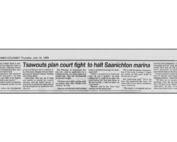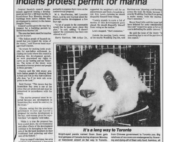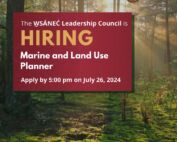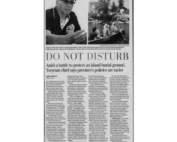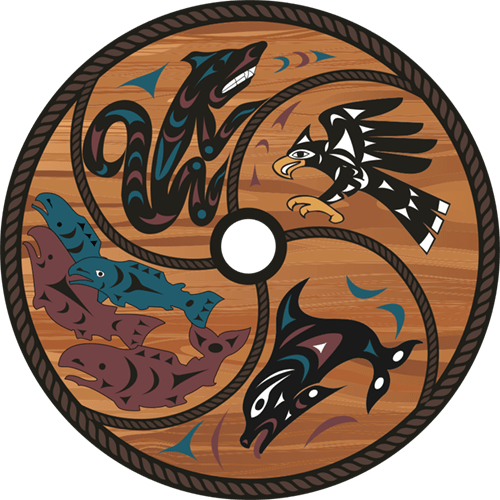ÍY, SȻÁĆEL SIÁM NE SĆÁLEĆE
This article was originally crafted as a response to concerns expressed by community members on the W̱SÁNEĆ Leadership Council (WLC) page regarding WLC discussions with Government on W̱SÁNEĆ people’s inherent, and Douglas Treaty rights. The response became too long to post on social media so this article aims to answer some of those concerns and highlights some complexities of the important work regarding W̱SÁNEĆ inherent rights. Recently, I have found this information to be more critical, and am called to share this perspective with the broader W̱SÁNEĆ community. This article contains an analysis of the complexities and issues of our NEHIMET (inherent rights) as it relates to the Douglas Treaty and our W̱SÁNEĆ communities, Inter – W̱SÁNEĆ governance issues, and the current situation. This is not focused on any Band Institution or individuals in particular but on W̱SÁNEĆ inherent rights holders as a collective. My aim is to provide this information from a neutral inherent rights holder perspective.
Since 1852 the North and South Saanich Douglas Treaties (DT) were intended to provide peace, protect, and acknowledge our inherent birthrights and responsibilities. These responsibilities/inherent rights have been passed down within our families from generation to generation, since the time when X’ÁLS (the creator) walked with our people. Our inherent rights lie with the people/families, we refer to these as our NEHIMET. They include hunting and fishing locations, harvesting areas, village sites and encampments, travel routes, and a family’s sacred and spiritual locations – to name a few. The places our families exercised our NEHIMET help outline our territory.
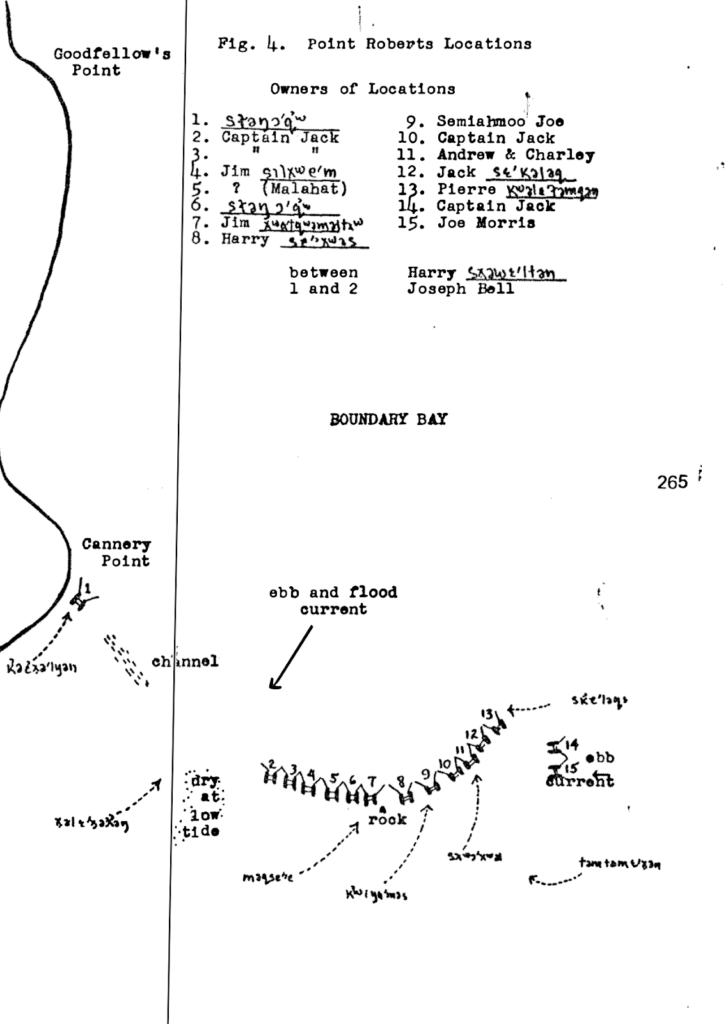
(Shown above: Notes on NEHIMET around Roberts Point )
When our people met with James Douglas, our birthrights were agreed to be protected “as formerly”. All male representatives of our families attended the meeting with Douglas as a collective because the rights, territory, and issues that were discussed that day extended to the broader W̱SÁNEĆ community/Nation. At that time, we did not have modern Bands and elected leaders.
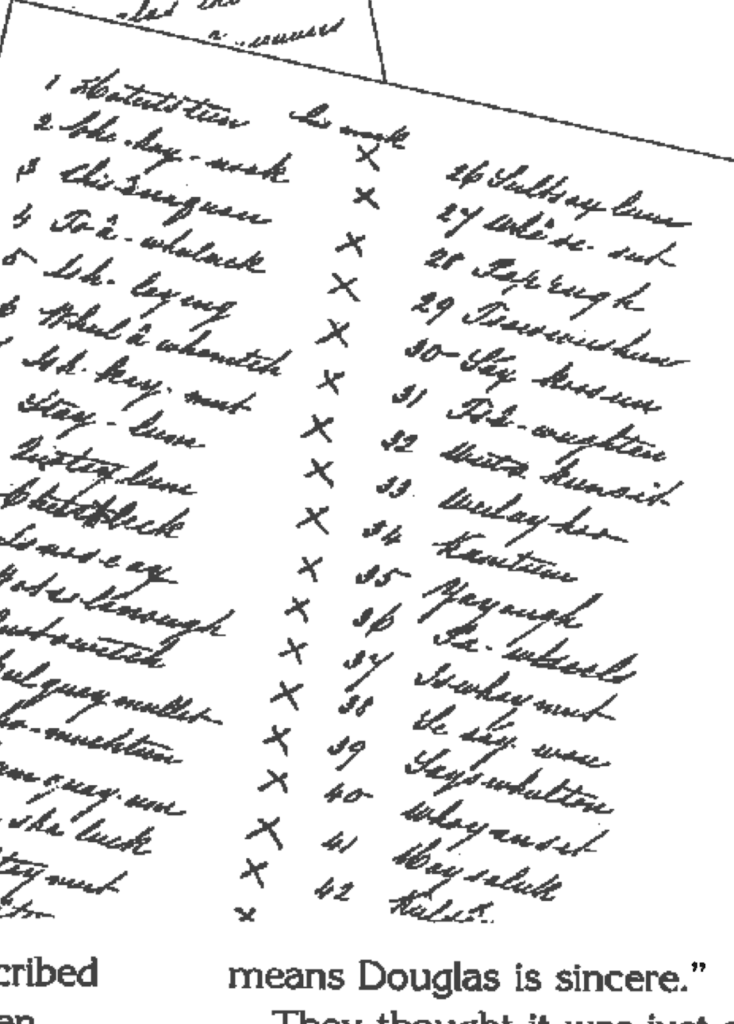
(Shown above: a portion of the Douglas Treaty)
Over the last 171 years, the Douglas Treaties have not been adequately recognized by Governments and therefore, have no policy or legislation to support their protection and implementation. The government recognizes that there are Douglas Treaties but does not formally acknowledge who the beneficiaries are, this has made them difficult to implement even following successful court decisions.
It is now up to us to formally affirm W̱SÁNEĆ as the beneficiaries and descendants of the Douglas Treaties as a first step.
Establishing a collective and coordinated voice for the protection and implementation of W̱SÁNEĆ rights has been an ongoing issue. In large part, this is due to Indian Act policies that have separated us and redefined our concepts of nationhood. This has created a complex governance challenge that benefits non-First Nations people and governments; it also makes it difficult for W̱SÁNEĆ to come together in modern-day W̱SÁNEĆ governance systems to implement traditional inherent right protocols. I believe we should now begin to address these issues together.
Twenty-nine years ago, in a sacred winter ceremony, seven elders (ancestors) stood together on the floor, exercising cultural protocol passed down my W̱ILṈEW̱ SNÁ (Indian Name – ȻELOȽEMKEN) and placed the inherent responsibility for the SWALET (family Reef Net locations, located in the Gulf Islands, San Juan Islands, and Point Roberts) and for the SX̱OLE (Reef Net) on me. These responsibilities have been with our families for thousands of years and are a big part of why I feel we must actively take part in efforts leading toward advancing and implementing our rights. The elders on the floor that day, three from Tsawout, three from Tsartlip, and two from Tseycum, represented the families connecting us to our NEHIMET. This is one example of how W̱SÁNEĆ inherent rights extend beyond a single member of a village/Band into the broader W̱SÁNEĆ Family/Nation and culture.
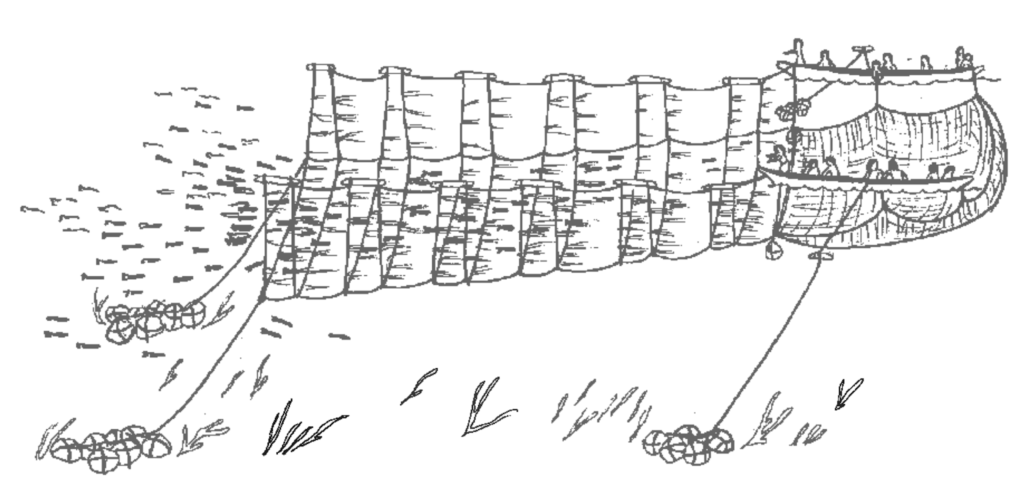
(Sketch of the SX̱OLE (Reef Net)
Introduction
Historically speaking, the W̱SÁNEĆ people were wealthy, we had everything we needed and so much more; this was because of the sacred relationships we had with each other, our territory, and nature. Recently, a researcher sent me a news clipping from the 1870s that told a story of a settler/explorer who stumbled upon a Saanich traditional gathering that he called a potlatch. The settler was shocked, he witnessed the host of this ceremony gifting his guests and witnesses with goods and belongings equaling $15k, $380K in today’s value.
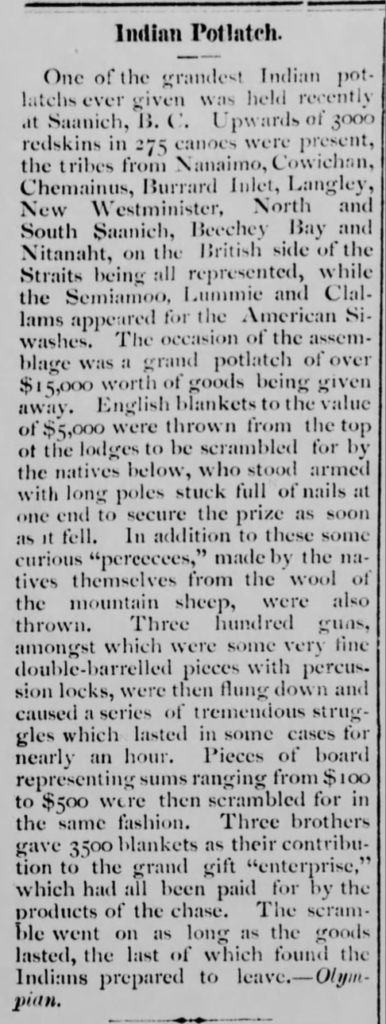
(Shown above: a description of a potlatch in W̱SÁNEĆ Territory)
At that time, W̱SÁNEĆ people’s jurisdiction was broadly recognized, and we were connected to the lands and economy (as formerly). The W̱SÁNEĆ people were wealthy in our homelands and waters; we had our own unique concepts of management and wealth, we had everything we needed because we upheld our laws and protected our birthright responsibilities and jurisdiction, and we respected nature as a relative.
Today, the settler Governments have asserted competing jurisdiction over our inherent rights and responsibilities. Over the past 171 years, the rights of the W̱SÁNEĆ people have been systematically removed, and our inherent rights to land and jurisdiction look nothing like they once did. They have been diminished.
In our history, there are stories about battles that took place to protect our fishing locations and territory, how W̱SÁNEĆ stood together to protect our people; there are stories of how a family’s fishing locations originated and became an inherent right and the responsibility of our families.
There are stories of a great trade economy extending far into the interior and south into what is now the United States. And there are stories of how XÁLS transformed our ancestors to create salmon and transformed other ancestors into other living beings, places, and formations, and in doing so created W̱SÁNEĆ Laws that guided our sacred relationships with our territory, the natural world, and each other.
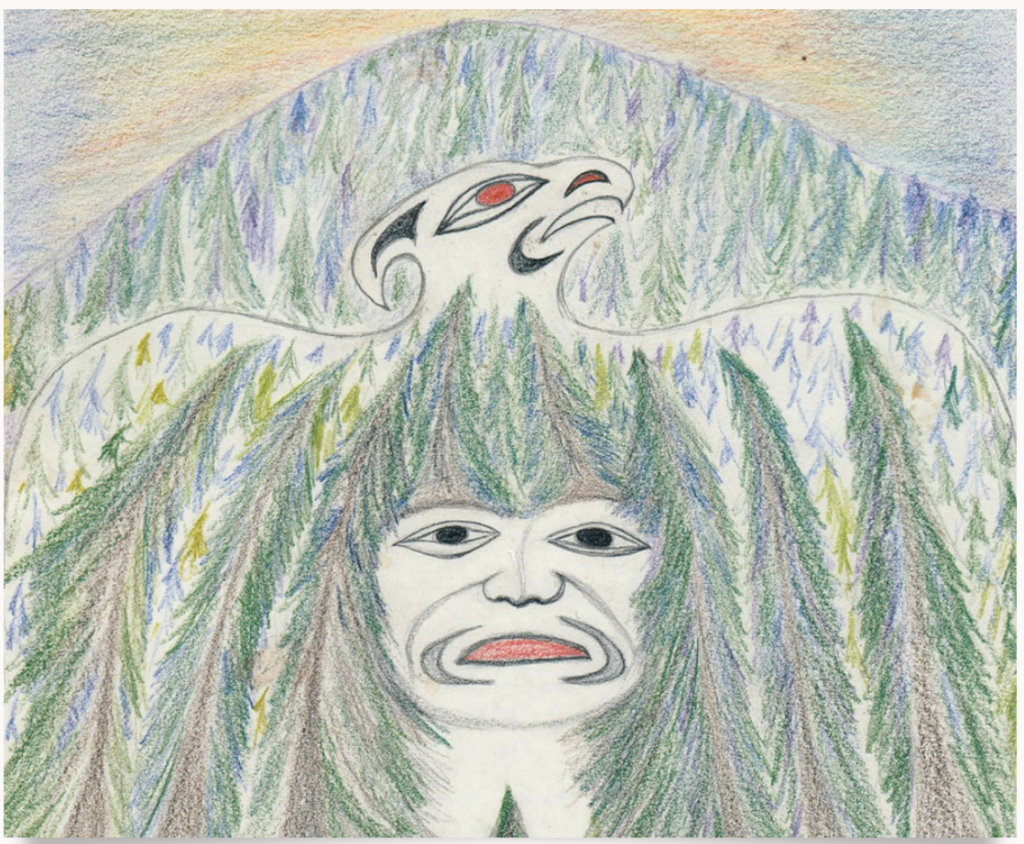
(Shown above: the story of LÁU,WELNEW illustrated by J,SIṈTEN )
European settlers saw the great wealth of our territory that nature had to offer. Colonizers took strategic and deliberate actions (including the Indian Act and the Reserve system) to displace W̱SÁNEĆ laws, undermine our leadership and management methods, degrade connections to the land and waters and each other, alienating us from our W̱SÁNEĆ birthrights and jurisdiction.
Our Responsibility
Our responsibility today is to reinstate W̱SÁNEĆ Laws and our inherent rights. Today we have no say over settler and commercial fisheries in our territory, we have very little say over development and growth and how our territory is treated. Chief and Councils do what they can, but harmful Western laws and policies continue to dominate.
About 8-10 years ago, I recall the first time we didn’t have any sockeye up the Fraser. First Nations up and down the Fraser came together. One of the recommendations was for each of us to go back to our respective communities and hold their sacred salmon ceremonies which we did. The following year was the biggest salmon run in more than a decade.
Reinstating our relationship and original (natural) management methods with the land and waters is something that we have sacred, ancient, and critical knowledge of, and is a sacred responsibility bestowed upon our families by XÁLS.
We have been so far removed from our inherent rights that we express these rights simply by not getting a hunting or fishing license. Don’t get me wrong, I commend the harvesters and those who gather for our communities, those who do what they can to uphold our inherent rights are incredibly important, and I have nothing but respect. However, the inherent rights are much deeper/broader than this, and with a shrinking land base, fragile animal relations, and increasingly polluted waters, we as W̱SÁNEĆ rights holders need a plan.
Only Together Can We Restore Our Inherent Rights
Advancing and coordinating efforts in the modern context have proven to be complex, technical, and extremely political. We can only do so much to protect or advance rights as individuals and Chief and Councils are divided on the topic as they are challenged by membership when discussing the advancement and breaches to our Douglas Treaty rights.
The Indian Act and reserve system add to this complexity. W̱SÁNEĆ people have been systemically divided into reserves, an act of divide and conquer. Each community/village site is now identified as a Nation, rather than part of the collective W̱SÁNEĆ Nation. Having multiple ‘Nations’ in W̱SÁNEĆ, makes it extremely challenging to enforce shared W̱SÁNEĆ laws, rights and territorial jurisdiction.

(Shown above: the current definition of a nation, in English)
Declaring nationhood status at the individual band level may support self-determination and empower each reserve at the band operational level but as we look to express our broader territorial rights, Band ‘nationhood’ encourages us to divide our territory into Band controlled areas, further diminishing W̱SÁNEĆ nationhood.
A Nation is typically defined as a body of people, that are united by common history, culture, language, and beliefs and that inhabit a specific territory. With the conversion of our Villages into ‘First Nations’ our concept of Nationhood has changed. This is problematic in a shared territory scenario where multiple Bands/First Nations share the same common territory and rights.
Asserting nationhood status at the Band level would likely result in a need to define territorial boundaries that are specific to that Band. For example; a Band would have to embrace colonial land concepts and redefine new band-specific territory by drawing new territorial lines that extend beyond its reserve boundaries and into a section of the broader collective W̱SÁNEĆ Territory, carving out a specific territory where an individual Band’s rights and title work can be implemented. This approach would be incredibly difficult and likely impossible to assert exclusive historical use by a single Bands members, not to mention it would be in contravention to the 1987 W̱SÁNEĆ Territorial Declaration and W̱SÁNEĆ laws such as ŦEŦÁĆES (Relatives of the deep), where we as W̱SÁNEĆ were given the responsibility of care.
However, since there ARE multiple individual Band governing bodies in W̱SÁNEĆ, each Band will likely benefit and choose to adopt a more individual approach to decision-making in areas close to their reserve lands, such as marine areas or public parks.
To ensure that the interests of all bands are well-represented, and to lessen the chance for conflict and confusion, it would be beneficial for W̱SÁNEĆ Bands to collaboratively create, agree on, and implement a singular set of policies that W̱SÁNEĆ Laws will guide. These policies would apply to settlers and government agencies, such as consent or permitting procedures for foreshore developments like docks and marinas, commercial fisheries, and boat or vessel anchorages in areas directly adjacent to reserve lands.
Considering that each band would have to engage with multiple levels of government, including the other W̱SÁNEĆ Bands, in order to achieve jurisdictional authority over site-specific areas, it makes sense to take a collective approach to discussing these agreements. Through collective discussions, all bands can ensure their interests are well-protected and supported while navigating these complex jurisdictional issues.
To achieve BROADER W̱SÁNEĆ territorial jurisdiction, a unified approach that addresses the interests of all bands would be beneficial and necessary for implementation.
Furthermore, a declaration for a united W̱SÁNEĆ Nationhood status is a true act of sovereignty, puts all levels of government and proponents on immediate notice, provides true Nation to Nation opportunities for restoring W̱SÁNEĆ jurisdiction beyond its reserve borders and into the W̱SÁNEĆ territory.
W̱SÁNEĆ share the same spiritual beliefs, culture, language, and territory; this is our shared history.
Bands that take an individual approach to restoring the rights that belong to all W̱SÁNEĆ, cause political friction and community confusion. Many members remain opposed to having their rights represented by an Indian Act entity or entities created to address the implementation or infringement of Douglas Treaty rights. A fragmented approach to discussions with governments and proponents results in micro arrangements, whereas a unified approach to these discussions has the potential to create a macro arrangement, one that could provide broader territorial jurisdiction, inclusion in the economy, and self-determination.
Using the courts to advance Douglas Treaty rights will tie us up for decades, it is expensive, and we take the risk that a judge will define our inherent rights for us.
IF we want change, if we want to stop the further degradation of our rights and territory for our future generations, then we, the descendants/beneficiaries of the Douglas Treaties, need to get organized and find ways to work together before our lands, fisheries, and rights are further mismanaged and degraded into complete extinction.
It is important to note that we have failed to trust and support the institutions that W̱SÁNEĆ co-developed with the intention of creating a space for W̱SÁNEĆ unity and advancing Douglas Treaty rights. This has happened three times – South Island Tribal Council, SENĆOŦEN Alliance, and Saanich Tribal Fisheries. When these promising, co-developed entities broke down, the work didn’t go anywhere, and the work remains to be done.
A Collective W̱SÁNEĆ Institution
So, who does the work? I too share the concerns of the rights holders – who will represent me and my family’s birthrights? No one person/community can decide what technical or administrative body should be used to coordinate the work that needs to be done. What is undeniable though is the need to act collectively.
Implementing broader Douglas Treaty rights and responsibilities will no doubt require the support of the community. However, it will also require an institution/body that can provide political advocacy, and legal and technical staff that can coordinate and facilitate the administration, advance technical matters, and ensure that the people have the resources and capacity to see W̱SÁNEĆ goals through to the end.
In any event, we need to find a way to stand together with an organized approach. We need to move forward with confidence, arms locked together, supported by the elders, the SENĆOŦEN language, knowledge holders, our youth, harvesters, and all community to guide the work forward.
We all have a choice. I hope we choose to engage and come together to do this work. Advocating for the advancement of our rights and expanding access to lands, waters, and economies. I hope that we provide the social license to an organization or entity to help do this work. One that will bring us together and implement our Treaty, advance our inherent rights, and work to reinstate W̱SÁNEĆ Laws.
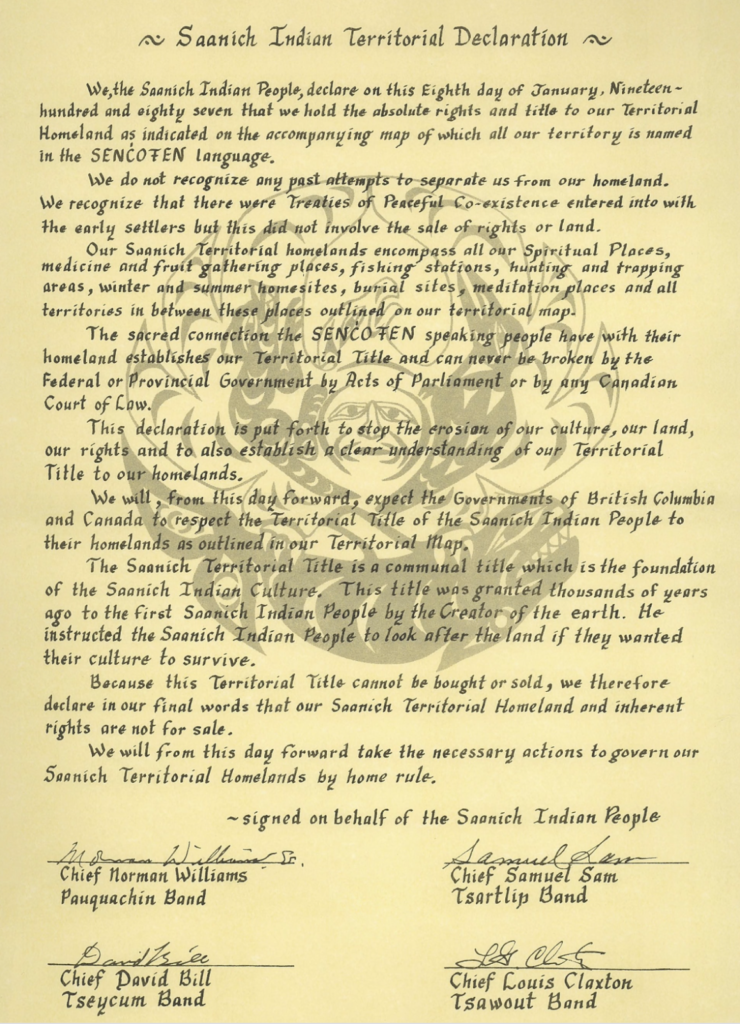
(Shown above: The Saanich Indian Territorial Declaration)
Our Territories Have Already Been Self-Determined
The ‘Saanich Indian Territorial Declaration’, developed and signed on behalf of the W̱SÁNEĆ people by the Saanich Chiefs in 1987, is a powerful document and declaration. It was so powerful that it resulted in Canada employing well-known anthropologists Dorothy Kennedy and Randy Bouchard to determine what and where the Saanich Territory existed. The 1991 report, titled “TRADITIONAL TERRITORIAL BOUNDARIES OF THE SAANICH INDIANS” was developed by interviewing elders in the W̱SÁNEĆ communities. The map and territorial boundaries were affirmed by neighboring nations. The map is very close to the W̱SÁNEĆ placenames map from the book Saltwater People, supporting W̱SÁNEĆ Nation Territory.
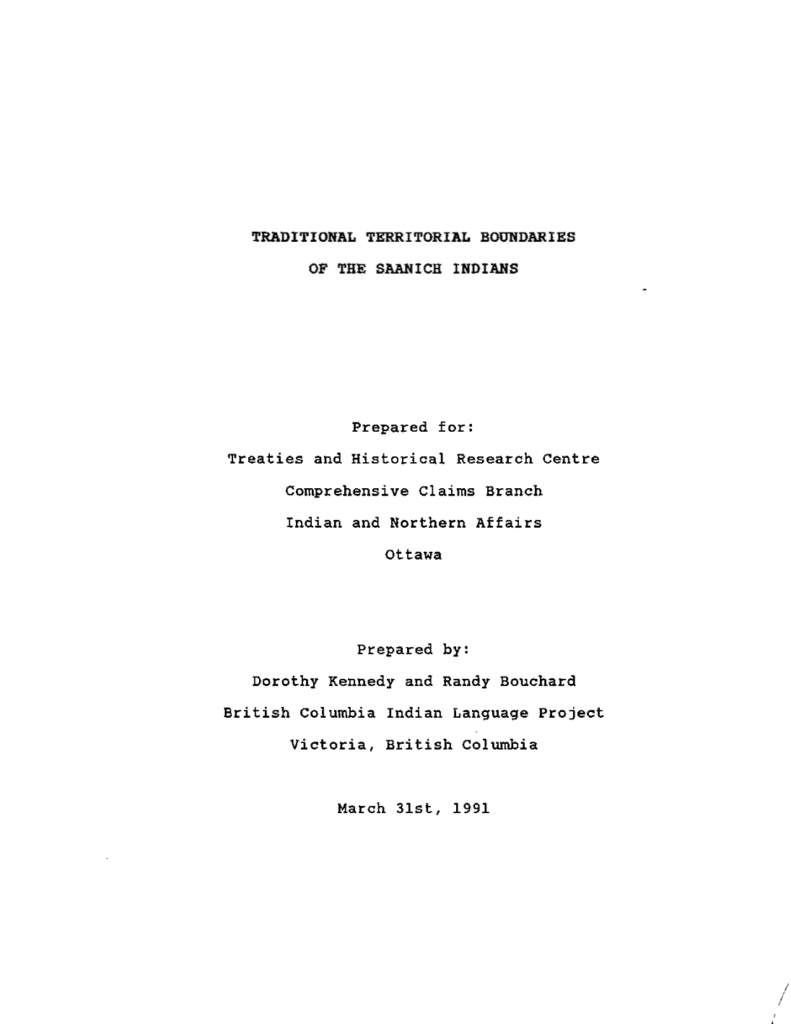
(Shown above: A report on W̱SÁNEĆ historical territory)
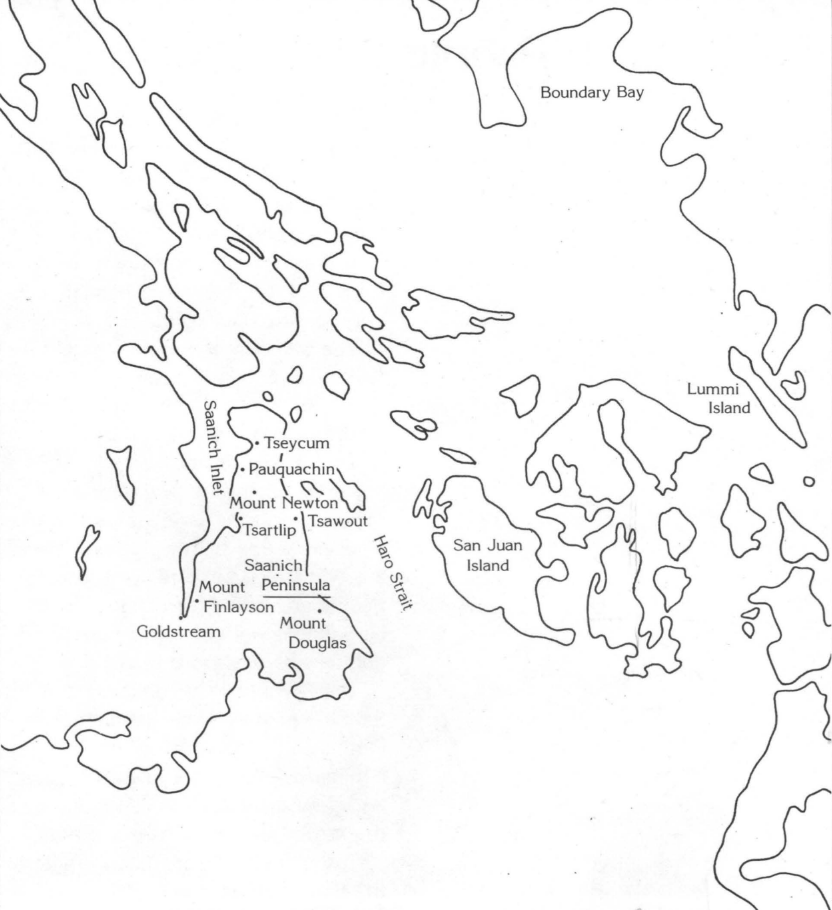
(Shown above: W̱SÁNEĆ territory, from the book The Saltwater People)
Let’s Fight the System, Not Each Other
“Acquiesce”; is a legal term that means to accept something by not doing anything about it. When nothing is being done our people are silent and calm and so it has become the norm to do nothing on broader jurisdictional matters. We appear to have accepted the status quo. The risk/outcome is the complete loss of our ability to meaningfully engage for our territory and sentences yet another generation to solving the broader collective issues.
Currently, we remain in a default situation, not advancing and complacent, watching the world around us grow and take up jurisdiction and land that is rightfully ours. Doing nothing is easy, it takes no effort, no capacity, no resources, and no risk of social debate, or criticism. It is easy to stand idly by, easy to offer criticism and pessimism, it is easy to be the voice of doubt and opposition; there is no personal risk in playing that role. Playing that role feeds the egos of those who are afraid of change or who are afraid of putting in the effort to do the difficult work for our people and territory.
The opposite of doing nothing takes courage, hard work, determination, support for one another, and trusting one another; building unity will take determination and will require commitment from those who are passionate about our inherent rights. Reinstating our ancient W̱SÁNEĆ laws and jurisdiction will take strength and require the same determination and values that our ancestors exercised. The opposite of doing nothing is doing something significant: where SELF-DETERMINATION and the reinstatement of our ancient responsibilities, and jurisdiction lie. Our conflicts should be outwards, not within.
We must change the system; the system will not change on its own
The Indian Act and the Indian Reserve system were created to oppress our people. It divided our Nation into bands; they were created to assimilate, to remove our people from our territory, to isolate our people onto the reserves, and to impose foreign government and jurisdiction over our lands and waters. The Indian Act has been dividing our people and creating inter-generational divisive impacts on our nationhood status for almost 150 years.
(Shown above: Philip Paul speaking at the UBCIC Special People’s Assembly of April 28-30, 1992)
We will not be able to change this if we do not find ways to work together, ways that are based on our own culture. We will have to change the system because the system will not change on its own.
We will have to experience discomfort and backlash; we will have to experience fear and anxiety because these are feelings that arise when change is taking place. If we are not experiencing these feelings, then we are likely being complacent.
Let’s break the cycle and find ways to be part of a solution, to build mechanisms, to stand together and support each other. The Creator gave us a sacred responsibility to care for our territory and maintain a sacred relationship with our relatives in the natural world; will we decide to do something about reinstating our jurisdiction, or continue to acquiesce?
In spite of all of the incredible hardships our generations have endured, we have survived. The great flood, where we received our name W̱SÁNEĆ – “The Emerging People” – is one of our first examples. Our communities are advancing in so many good ways. There has been resiliency and great leadership demonstrated with some amazing projects to better our communities.
I have nothing but respect for the elected Chief and Council leadership. The roles are incredibly difficult and challenging with little recognition and a lot of criticism. I respect the heads of families and representatives who come forward to express their views and concerns. I respect our youth who are beginning to demonstrate leadership, learning W̱SÁNEĆ history, and voicing concerns. We need these voices to provide ideas on how to move forward and make sure that W̱SÁNEĆ not only survives the next 170 years but thrives. Let’s be the Emerging People.
We were the richest people on this earth, we had everything that we needed and more. We took no more than needed. We respected all life forms. Our seasons and moons dictated our harvesting seasons. The seasons, moons, and winds were respected as family laws that were a part of our everyday lives. The beautiful connection and responsibility we had to our territory and the natural world was given to us by the creator. Our life was based on love and respect, love for our families, respect for each other, and for nature.
Today, we look upon our territory and the natural world relatives and see the salmon stocks diminishing. The continued development of our territory leads to diminished opportunities for harvesting. Where do we hunt? Where can we dig clams? where can we peel bark? Will the Sockeye survive the next 20 years? Our connection to our territory and economies is being diminished by systemic oppression, a death-by-a-thousand-cuts scenario. What will we do about it?
I believe it’s time to look beyond the issues that constrain our obligations when addressing our broader territorial rights. Our inherent rights are embedded in our families, just like the salmon, the killer whale, the trees, the stars, the moon, the sun, and the winds, all once were families that guided our life by W̱SÁNEC Laws.
For the purpose of protecting our territory, restoring our relationships, and restoring our economies, we need to begin to unlearn the colonial institutions that bring divisions among our people. It’s time we find ways to work together as the W̱SÁNEĆ Nation. It’s time to re-establish our W̱SÁNEĆ sovereignty by looking to the W̱SÁNEĆ traditions and customs that have guided the Emerging People for thousands of years.
I would ask you to take some time to ask yourself these questions: no right or wrong answers here, they are questions that each of us may consider when contemplating your inherent rights and the Douglas Treaty.
- Are you a W̱SÁNEĆ harvester or a W̱SÁNEĆ person that benefits from what others have harvested?
- What does Hunt & Fish as Formerly mean to you?
- What do you think “to Hunt & Fish” meant to our ancestors (pre-colonial)?
- How do you think we can get to Fish as Formerly in the modern day?
- Are you a W̱SÁNEĆ person that does not harvest? What are your inherent and Douglas Treaty rights?
- Are you familiar with W̱SÁNEĆ Laws pertaining to inherent rights? If no, would you like to learn?
- Do you think that historical activities included management and trade?
- Do you think that the Douglas Treaty should have economic rights in the modern context? e.g., commercial rights, economic rights/benefits, tax benefits (such as shares in taxes collected in your territory), compensation for loss of use, and breaches of the Douglas Treaty?
- Do you think that W̱SÁNEĆ people should have jurisdictional authorities? E.g, W̱SÁNEĆ Laws that apply to all people in W̱SÁNEĆ Territory, or W̱SÁNEĆ decision-making ability on activities that happen on the land and water?
- Do you think that W̱SÁNEĆ should be re-establishing jurisdictional authorities in modern-day context?
- Do you feel like you/W̱SÁNEĆ should be compensated for the losses our people have endured for the infringements of our inherent rights?
- Do you think the Douglas Treaty is an individual right, family right or communal right, or all the above?
- Do you believe you have a right to make decisions about the future of the Douglas Treaty, or is there a head of your family for that? When is the last time your family discussed this?
- Have you asked your Chief and Council what they are doing to uphold the Douglas Treaty?
- Do you believe there should be a unified W̱SÁNEĆ body to represent your Douglas Treaty interests?
- Who do you expect to be the communal/collective voice/s in representing your inherent/Douglas Treaty rights?
- Do you support your Chief and Council when they defend the Douglas Treaty? For example; Trans Mountain Expansion Project, or Roberts Bank Terminal expansion, opposition to commercial herring fishery, BC Ferry expansion etc..?
- Do you think your Band is a Nation, or do you think W̱SÁNEĆ is a Nation, or both?
- Do you think it’s the government’s responsibility to define our inherent rights/Douglas Treaty?
HÍŚKWE for taking the time to read this through. I hope I have not offended you in any way; my only intent is to offer my perspective on the current situation as it pertains to W̱SÁNEĆ Inherent Rights and the Douglas Treaty. I am totally open to chat in person or send me a email or text.
Respectfully,
ȻELOȽEMKEN
Email: gord.elliott@https://wsanec.com/
Cell #: (778) 977-4342




